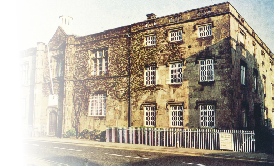


The Dictionary was published in 1755. Oxford University rewarded him with a Master of Arts degree, which came just in time for him to include it on the title page of the Dictionary. Many of the doors that had previously been closed to him by the absence of such a degree, were now opened.
In July of 1762 the Prime Minister awarded Johnson a pension for life of 300 pounds a year. This was potentially awkward. Johnson's Dictionary had given the definition, "Pension: An allowance made to anyone without an equivalent. In England it is generally understood to mean pay given to a state hireling for treason to his country." Johnson consulted a friend, the painter Sir Joshua Reynolds, who assured him that there was no impropriety in his taking the money, since he was not about to do the Prime Minister or his party any favours in return, and no one supposed that he was. The money was a reward for his honourable service to his country in producing the Dictionary, not a bribe for future questionable acts. So Johnson took the pension, which gave him the financial security he had never had before.
In 1777 a group of booksellers decided to publish a series of volumes of recent English poets. They asked Johnson to write a biographical sketch of each poet, providing a list of 47 names, later expanded to 52, for inclusion in the volumes. He agreed to do so for 200 guineas. They were thinking of perhaps two or three pages on each poet. He gave them about three hundred and seventy thousand words in all, simply because, once he got started, he enjoyed the work, and thought it worth while. The project took four years, being completed in 1781.
On 17 June 1783, Johnson found on waking that he was suffering a stroke. He could
not rise from his bed. He tried to speak, and found that, although he could think
the words, he could not say them. He managed to summon help, and as time passed he
slowly recovered his power of speech. But now various ailments were beginning to
afflict him: circulatory problems; bronchitis and emphysema; congestive heart failure;
and progressive rheumatoid arthritis. He accepted invitations to travel and to visit
a few friends, and he kept active until November 1784, but finally was unable to
leave his bed. His doctors prescribed opium for his pain, but he distrusted the drug,
and would take only a small portion of the amount prescribed. Finally, he asked his
doctor whether he was likely to live out the month, and on being told that he was
not, he refused all further opium and other pain-
In the next few years, he wrote articles on demand for the Gentleman's Magazine and other publications. As his biographer Bate puts it, there are "short biographies of men noted in medicine, science, literature, naval exploration, and warfare; poems in both Latin and English; monthly articles on political and other current events abroad and other writings that show his knowledge not only of literature, politics, religion, and ethics, but also agriculture, trade, and practical business; philology, classical scholarship, aesthetics, metaphysics; medicine and chemistry; travel, exploration, and even Chinese architecture."
Johnson's interests extended to science and technology as well as to literature. When Richard Arkwright invented, or improved, the automatic spinning machine that was to revolutionize the textile industry, he found that Johnson was the only one of his acquaintances that understood the principle at once, without explanation.
Before 1748, Johnson published practically nothing under his own name. He wrote extensively
-
And so it was that he began work on a Dictionary of the English Language. In June, 1746, he signed an agreement with a group of publishers. They would pay him 1,000 guineas, equivalent to about £230,000 today.
All of the expenses that he incurred were to come out of this. So with six copyists to help him, he read through numerous books by "standard authors" and marked their use of various words. His copyists then copied out the sentences onto slips of paper, underlining the word being illustrated, marked the slip with a large letter for the initial of the word, and filed it.
Johnson then wrote definitions for over 40,000 words, with different shades of meaning, illustrating the meanings with about one hundred and fourteen thousand quotations that he had gathered. His work has served as the basis for all English dictionaries ever since. A comparison of their definitions with his shows obvious borrowing, simply because his definitions are so good. Some of them show the "impish" side of Johnson's nature, and these are naturally the ones that are popularly remembered and quoted. The New English Dictionary, now the Oxford English Dictionary, on which literally thousands of scholars collaborated , took seventy years to complete. Johnson, in one room with mostly borrowed books and six copyists, completed his task in nine years.